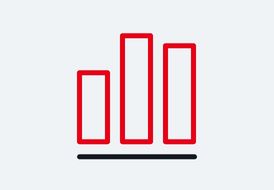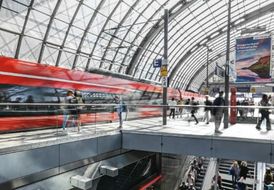Development in the year under review
- Severe restrictions on operations (scarcity of resources, construction work in the network) placed a burden on quality and costs.
- The effects of the war in Ukraine had an impact on the transport portfolio.
- Increasing factor costs and additional burdens continue to put economic development under pressure.
DB Cargo | 2022 | 2021 | Change | 2019 | |
absolute | % | ||||
Punctuality (%) | 66.3 | 69.5 | –3.2 | – | 74.0 |
Customer satisfaction (SI) | 67 | 70 | –3 | – | 61 |
Freight carried (million t) | 222.3 | 226.5 | –4.2 | –1.9 | 232.0 |
Volume sold (million tkm) | 84,468 | 84,850 | –382 | –0.5 | 85,005 |
Volume produced (million train-path km) | 169.1 | 169.0 | +0.1 | +0.1 | 162.5 |
Capacity utilization (t per train) | 499.4 | 502.0 | –2.6 | –0.5 | 523.2 |
Total revenues 1) (€ million) | 5,244 | 4,982 | +262 | +5.3 | 4,449 |
External revenues 1) (€ million) | 4,998 | 4,713 | +285 | +6.0 | 4,188 |
EBITDA adjusted 1) (€ million) | –257 | –81 | –176 | – | 13 |
EBIT adjusted 1) (€ million) | –665 | –467 | –198 | +42.4 | –308 |
EBIT margin (adjusted) 1) (%) | –12.7 | –9.4 | –3.3 | – | –6.9 |
Gross capital expenditures 1) (€ million) | 452 | 527 | –75 | –14.2 | 570 |
Employees 1) as of Dec 31 (FTE) | 31,167 | 30,753 | +414 | +1.3 | 29,525 |
Employees 1) annual average (FTE) | 31,027 | 30,868 | +159 | +0.5 | 29,280 |
Employee satisfaction (SI) | 3.8 | – | – | – | – |
Share of women as of Dec 31 (%) | 13.0 | 12.0 | +1.0 | – | 11.5 |
Specific final energy consumption compared to 2006 (based on tkm) (%) | –26.0 | –23.2 | –2.8 | – | –21.0 |
1) Figure for 2021 or as of December 31, 2021, adjusted due to the intra-Group reallocation of the FLS business area.
The punctuality of DB Cargo has decreased as a result of reductions in capacity due to construction measures, increased primary disruptions, particularly in relation to infrastructure, and highly utilized freight transport corridors. The operating situation was under a lot of strain in many train formation yards. The high levels of sick leave at times also hampered punctuality. As a result, there were increased disruptions in operating procedures and a significant increase in tailbacks.
This also had an impact on customer satisfaction, which fell in 2022.
Freight carried and volume sold dropped slightly. This was largely influenced by the decline in steel transports in the United Kingdom, a difficult operating situation due to construction and disruptions, particularly in Germany, and the effects of the war in Ukraine. Positive effects from the first-time inclusion of DB Cargo Switzerland performance data, the positive business development of intermodal transport (especially on the trans-Eurasian corridor at the beginning of the year) and increased automobile, wood and paper transport had a dampening effect in some cases.
Economic development was weaker. Operating profit figures decreased significantly as a result of additional burdens. The growth in income was more than compensated for:
- Revenues: Significant increase, driven by the positive development in all regions, driven above all by price-related factors.
- Other operating income: Decrease (–5.0%/€ –27 million), driven by lower Government grants (primarily facility price support) and lower effects from the release of provisions. This was offset, among other things, by a refund of payments from the noise-based train-path pricing system in Germany and the sale of real estate in Great Britain.
On the expense side, there were significant additional burdens due to inflation and quality, driven primarily by increases in the cost of materials:
- Cost of materials: Significant increase (+9.4%/€ +289 million), due in part to higher energy costs and higher maintenance expenses due to inflation.
- Other operating expenses: Increase (+13.5%/€ +91 million) primarily due to increased rentals of locomotives and freight cars, as well as more purchased digital services.
- Personnel expenses: Increase (+3.5%/€ +66 million) primarily due to a higher average number of employees and due to collective bargaining agreements.
- Depreciation: (+5.7%/€ +22 million) mainly due to higher vehicle rentals subject to mandatory capitalization (IFRS 16).
The decline in capital expenditures is due, on the one hand, to the war in Ukraine. On the other hand, the large-scale modifications of locomotives that are due to be capitalized for 2022 were delayed because the procurement processes for materials took significantly longer than in previous years due to an extreme increase in supplier costs.
The number of employees increased as a result of the further implementation of recruitment initiatives for operating personnel.
Employee satisfaction is virtually unchanged compared with 2020, despite operational requirements.
DB Cargo’s recruitment initiatives focused on the recruitment of women. The proportion of women has increased slightly as a result of these targeted recruitment measures.
In 2022, we achieved a further reduction in the specific final energy consumption of rail (traction, based on tkm) compared with 2006. This is largely due to the modernization of the fleet. In addition, the energy-saving LEADER driving assistance system and the automatic start/stop on shunting locomotives also had an effect.
- Performance gains due to intermodal transport (especially on the trans-Eurasian corridor) due to high ocean freight rates.
- Additional burdens due to the war in Ukraine, rising factor costs (especially for energy) and lower government subsidies.
- Operating profit development still under pressure.
Central Europe region | 2022 | 2021 | Change | 2019 | |
absolute | % | ||||
Freight carried (million t) | 232.7 | 231.5 | +1.2 | +0.5 | 225.2 |
Volume sold (million tkm) | 68,313 | 68,414 | –101 | –0.1 | 68,265 |
Volume produced (million train-path km) | 136.1 | 135.8 | +0.3 | +0.2 | 127.3 |
Total revenues (€ million) | 5,375 | 5,172 | +203 | +3.9 | 4,959 |
External revenues (€ million) | 3,698 | 3,470 | +228 | +6.6 | 3,443 |
EBITDA adjusted (€ million) | –386 | –190 | –196 | +103 | –112 |
EBIT adjusted (€ million) | –678 | –459 | –219 | +47.7 | –333 |
Gross capital expenditures (€ million) | 328 | 385 | –57 | –14.8 | 456 |
Employees as of Dec 31 (FTE) | 22,171 | 21,882 | +289 | +1.3 | 21,433 |
Overall, performance development in Central Europe was at the previous year’s level. The positive business development due to the increase in intermodal transport (especially on the trans-Eurasian corridor at the beginning of the year) was largely consumed by dampening effects from construction and disruption-related restrictions on rail infrastructure, operational bottlenecks and the effects of the war in Ukraine (including the discontinuation of transport services to Russia and declines in demand for steel and chemical transport). Additional coal transports to secure energy supply in Germany had a positive effect from October onwards.
Economic development remains very challenging due to the operational situation. The operating profit figures deteriorated significantly:
- Revenues: Largely price-related increase. The slightly positive performance development had a supporting effect.
- Other operating income: Declines due to the reduced funding volume for the facility pricing system in Germany and the discontinuation of a positive one-off effect in the previous year were only partially offset by a non-periodic refund from the dissolution of the “noise bonus fund” as the modification of freight cars has been completed.
On the expense side, there were additional expenses driven by the cost of materials:
- Cost of materials: This increase was primarily due to higher train-path and energy expenses, due mainly to higher prices.
- Other operating expenses: The increase resulted primarily from increased leasing of freight cars, higher IT costs, higher costs for qualification measures and increased additions to provisions for impending losses.
- Personnel expenses: The increase is primarily due to collective bargaining agreements, with a slight increase in the number of operating employees.
- Depreciation: The increase is among others a result of additional rentals of locomotives and freight cars.
Capital expenditures declined as DB Cargo did not follow through with the purchase of 110 freight cars from a Russian manufacturer due to sanctions.
The number of employees increased slightly. The addition and qualification initiative for operative personnel was continued.
- Burdens from strikes in the United Kingdom.
- Burdens from higher energy prices.
Western Europe region | 2022 | 2021 | Change | 2019 | |
absolute | % | ||||
Freight carried (million t) | 40.2 | 45.2 | –5.0 | –11.1 | 46.4 |
Volume sold (million tkm) | 10,535 | 11,562 | –1,027 | –8.9 | 11,906 |
Volume produced (million train-path km) | 24.3 | 25.4 | –1.1 | –4.3 | 27.3 |
Total revenues (€ million) | 748 | 708 | +40 | +5.6 | 675 |
External revenues (€ million) | 549 | 535 | +14 | +2.6 | 546 |
EBITDA adjusted (€ million) | 64 | 59 | +5 | +8.5 | 91 |
EBIT adjusted (€ million) | –20 | –30 | +10 | –33.3 | 15 |
Gross capital expenditures (€ million) | 45 | 84 | –39 | –46.4 | 82 |
Employees as of Dec 31 (FTE) | 4,369 | 4,231 | +138 | +3.3 | 4,190 |
Performance development in Western Europe was poor. This is mainly due to developments in the United Kingdom:
- Steel transport at DB Cargo UK declined significantly due to a sharp decline in steel production in Great Britain due to the sharp rise in energy prices. In addition, since the summer of 2022, a large number of strikes have caused major disruption on the British railway system and had an additional negative impact on performance development.
- Portfolio adjustments in the form of the replacement of automotive transport services by intermodal transport had a positive effect at DB Cargo France.
- In Spain, Transfesa was able to maintain its volume sold at the previous year’s level despite the continued tense market for new and used car transport.
Economic development improved, but remained challenging. Operating profit figures rose, driven by income growth:
- Revenues: Increase, driven by the development in Spain. Higher prices and better capacity utilization in particular had an effect here. Adjusted for exchange rate effects, the increase was somewhat less pronounced.
- Other operating income: Increase primarily as a result of higher income from the sale of real estate by DB Cargo UK. Low positive exchange rate effects had a supporting effect.
The disproportionately small increase in expenses was driven by the cost of materials:
- Cost of materials: Increase primarily as a result of increased energy costs and higher maintenance expenses at DB Cargo UK and DB Cargo France, as well as an increase in transport services purchased at Transfesa for price-related reasons.
- Personnel expenses: Increase due to the higher average number of employees at DB Cargo UK. Adjusted for exchange rate effects, the increase was less significant.
- Other operating expenses: Increase due to additions to provisions for impending losses in the United Kingdom, among other things.
In contrast, the decline in other expense items had a dampening effect:
- Depreciation: Decline mainly due to the discontinuation of a one-off effect in the previous year in the United Kingdom.
Capital expenditures declined, mainly due to decreased investment activities at DB Cargo UK. The large-scale modifications of locomotives that are due to be capitalized for 2022 were delayed because the procurement processes for materials took significantly longer than in previous years due to an extreme increase in supplier costs.
The number of employees increased significantly, in particular at DB Cargo UK to compensate for the lack of operating personnel that occurred in the previous year.
- New transport and expansion of available offers, in particular in Poland and the Czech Republic.
- Burdens due to the war in Ukraine and increased factor costs, particularly for energy.
Eastern Europe region | 2022 | 2021 | Change | 2019 | |
absolute | % | ||||
Freight carried (million t) | 19.5 | 17.6 | +1.9 | +10.8 | 15.5 |
Volume sold (million tkm) | 5,621 | 4,875 | +746 | +15.3 | 4,834 |
Volume produced (million train-path km) | 8.8 | 7.9 | +0.9 | +11.4 | 7.9 |
Total revenues (€ million) | 395 | 319 | +76 | +23.8 | 304 |
External revenues (€ million) | 242 | 190 | +52 | +27.4 | 199 |
EBITDA adjusted (€ million) | 42 | 31 | +11 | +35.5 | 34 |
EBIT adjusted (€ million) | 15 | 8 | +7 | +87.5 | 11 |
Gross capital expenditures (€ million) | 57 | 55 | +2 | +3.6 | 32 |
Employees as of Dec 31 (FTE) | 4,021 | 3,944 | +77 | +2.0 | 3,902 |
The performance development in eastern Europe was positive, driven by new transport (inland transport at DB Cargo Polska and market entry in Austria by DB Cargo Czechia) and the expansion of existing transport (chemistry, coke and automotive transport by DB Cargo Romania and new production concepts at DB Cargo Hungaria), and was above the pre-Covid-19 level.
The economic development was pleasing: the operating profit figures improved significantly. This was driven by a growth in income:
- Revenue: Significant increase, primarily due to demand. Price effects and the expansion of available offers in Poland also had a supporting effect. Adjusted for exchange rate effects, the increase was even more pronounced.
- Other operating income: Slight decline at a low level. At DB Cargo Polska, the positive effects from asset sales and the reversal of provisions fell, among other things, while higher insurance reimbursements in Romania almost completely compensated for this.
In terms of expenses, there was a clear volume-related increase, although the increase was lower than the increase in income:
- Cost of materials: Significant increase mainly due to the development of demand, higher maintenance services and rising energy costs. Exchange rate effects had a partially compensating effect.
- Personnel expenses: Increase primarily due to collective bargaining agreements at DB Cargo Polska. In addition, DB Cargo Romania and DB Cargo Czechia significantly expanded their workforce.
- Other operating expenses: The increase is as a result of higher costs due to inflation and increased quantities.
- Depreciation: The increase is due to the higher volume of capital expenditures.
Gross capital expenditures increased slightly due to EU-subsidized locomotive purchases in Poland.
The number of employees increased in Poland, the Czech Republic and Romania.
- Special transport as a growth driver.
- Burden on Eurasian transport due to the war in Ukraine.
FLS | 2022 | 2021 | Change | 2019 | |
absolute | % | ||||
Total revenues (€ million) | 630 | 643 | –13 | –2.0 | – |
External revenues (€ million) | 510 | 518 | –8 | –1.5 | – |
EBITDA adjusted (€ million) | 23 | 20 | +3 | +15.0 | – |
EBIT adjusted (€ million) | 18 | 14 | +4 | +28.6 | – |
Gross capital expenditures (€ million) | 21 | 2 | +19 | – | – |
Employees as of Dec 31 (FTE) | 606 | 696 | –90 | –12.9 | – |
The economic performance of the FLS area was encouraging, driven by declining expenses. The operating profit figures improved significantly. Income also fell, but to a lesser extent:
- Revenues: Price effects and strong development in special transport partially compensated for the decline in sales in Eurasia business as a result of the war in Ukraine.
- Other operating income: Declined at a low level due to reduced services for third parties.
On the expense side, there was a disproportionate decrease driven by the cost of materials:
- Cost of materials: The decline was driven by the development of demand, among other things. Rising energy costs partially compensated for this.
- Other operating expenses: Decreased as a result of
the discontinuation of the allocations to be made to DB Schenker companies operating at country level. - Personnel expenses: Decreased primarily as a result of the lower average number of employees.
- Depreciation and amortization: Roughly at the previous year’s level.
Gross capital expenditures increased significantly due to the extension of existing lease agreements for logistics centers (in Hamburg, among others).
The number of employees fell, due in particular to the integration of FLS into the DB Cargo business unit, as FLS employees from Switzerland, the Netherlands, Belgium, Romania and Bulgaria were assigned to DB Cargo companies operating at country level.


